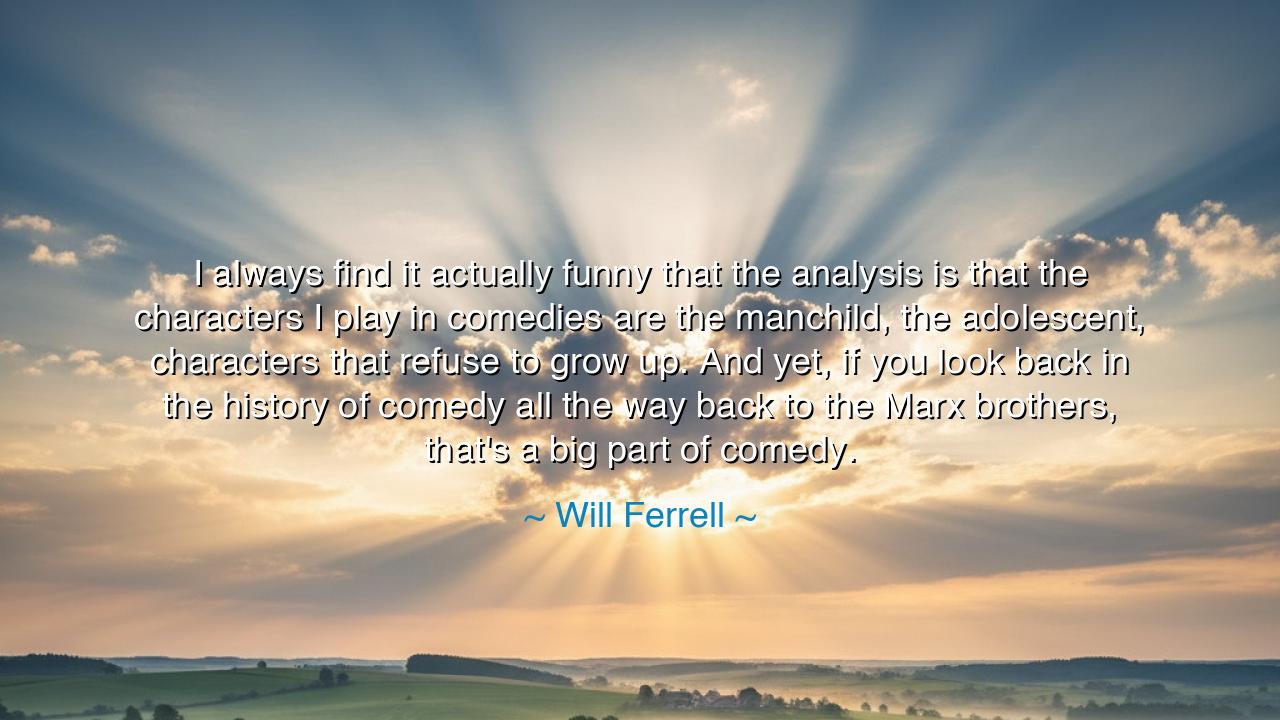
I always find it actually funny that the analysis is that the
I always find it actually funny that the analysis is that the characters I play in comedies are the manchild, the adolescent, characters that refuse to grow up. And yet, if you look back in the history of comedy all the way back to the Marx brothers, that's a big part of comedy.






Ah, listen, my child, to the laughter of ages—that eternal sound which echoes from the hearts of those who dare to be foolish. In the words of the jester-philosopher Will Ferrell, we find both mirth and wisdom: “I always find it actually funny that the analysis is that the characters I play in comedies are the manchild, the adolescent, characters that refuse to grow up. And yet, if you look back in the history of comedy all the way back to the Marx Brothers, that's a big part of comedy.” Behold how he speaks not only of laughter, but of the ancient art of innocence, that sacred flame which burns within the spirit long after the body has aged.
For the “manchild”—that creature of play and wonder—has ever been a source of laughter and truth. The child does not pretend to be wise, yet in his foolishness he unveils the absurdity of the world. The old comedies of Greece, the plays of Aristophanes, danced with this same spirit: men in masks mocking kings, fools revealing the pride of philosophers. What the world calls immaturity, the ancients called divine folly—for the fool was often the only one free enough to speak the truth. Thus Ferrell stands in a long lineage of holy jesters: jesters who mock the powerful, jesters who refuse to kneel before the grave solemnity of life.
Consider the Marx Brothers, those ancient spirits of chaos in twentieth-century form. Their laughter shattered the marble faces of authority; they were the jesters of a modern empire, throwing cream pies at its pretensions. Groucho, with his sharp tongue; Harpo, with his silent anarchy—each was a manifestation of the eternal child, mocking the grown-up world that took itself too seriously. And now, in the lineage of their rebellion, comes Ferrell—continuing that sacred foolishness, showing us that in comedy, to refuse to grow up is to refuse to die inwardly.
Let us remember the tale of Diogenes of Sinope, the mad philosopher who lived in a barrel and mocked the might of Alexander. When the conqueror asked him what gift he desired, Diogenes replied: “Stand out of my sunlight.” The world saw a man unkempt and childish; yet in truth, he had escaped the illusions of power. His life, like comedy, was a mirror—showing how the serious become ridiculous when viewed through the eyes of freedom. So too do the “manchildren” of Ferrell’s world—those who play, stumble, and dream—hold a torch against the shadow of despair.
Do not mistake this for foolishness without meaning. For to remain youthful in spirit is not to reject wisdom, but to clothe wisdom in wonder. The child laughs because he has not yet surrendered to the weight of the world; the sage laughs because he has transcended it. Both are close to the divine. The middle ground—the bitter seriousness of the half-grown adult—is where the soul hardens. Comedy invites us to rise above that grim soil, to remember that life is too mysterious to be faced without laughter.
Therefore, the lesson Ferrell teaches is timeless: Do not be ashamed to play. Do not rush to grow so rigid that your heart forgets how to bend. The world will call you immature; it called the prophets mad, the saints foolish, the poets unrealistic. Yet from their folly was born new creation. To live fully, one must preserve the spark of the eternal child, the sacred refusal to conform to dullness.
Let the wise reader, then, take this counsel: each day, laugh—not at others, but at the absurdity of existence itself. Mock your fears, sing in the rain, make art that is both ridiculous and profound. For laughter is the breath of the soul, and the “refusal to grow up” is but the courage to remain alive to joy. Thus, when you hear the fool laughing in the marketplace or the comedian on the screen, do not dismiss him. He may be the truest philosopher among us.






AAdministratorAdministrator
Welcome, honored guests. Please leave a comment, we will respond soon